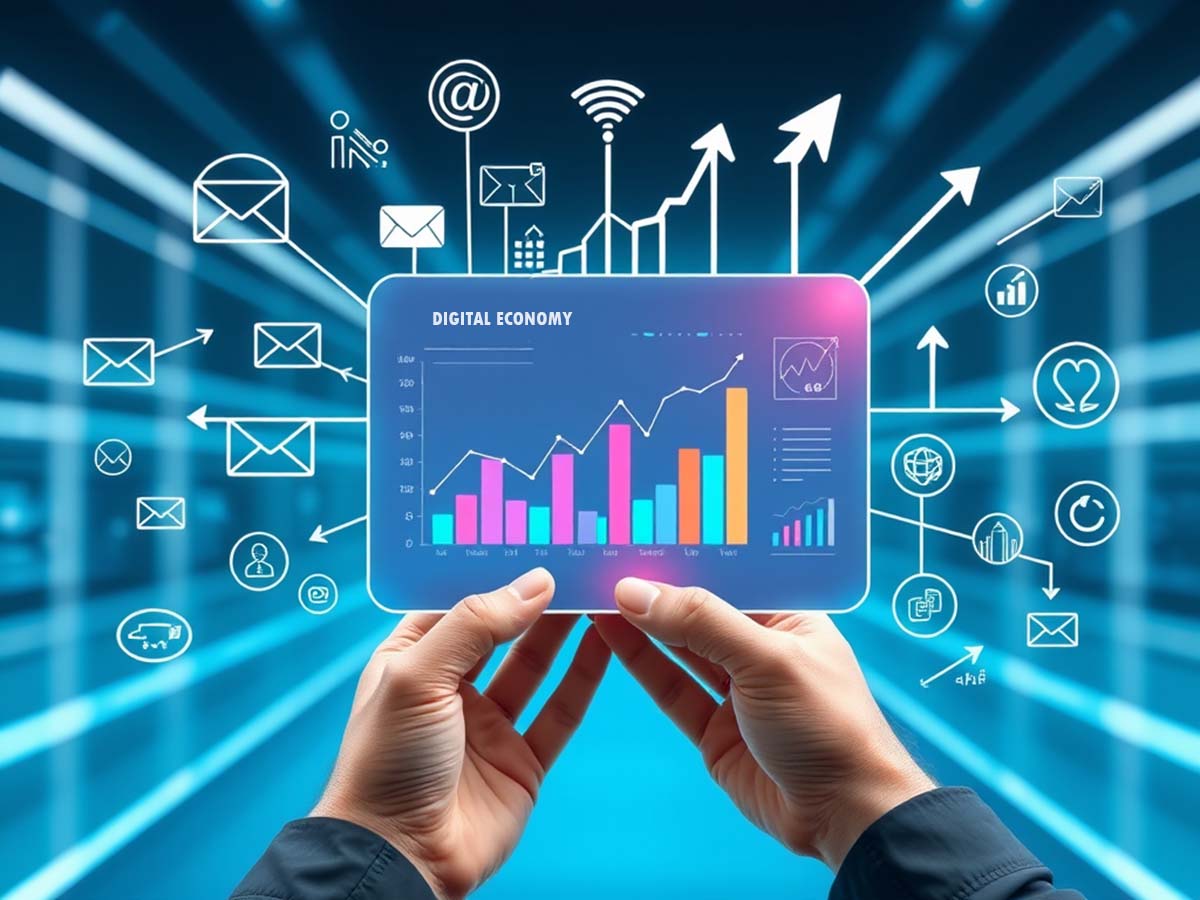
The digital economy has changed the way we work, shop, and connect with one another. Whether you are a social media user, a content creator, or a small business owner, the changes brought on by technology have a direct impact on your daily life. The shift to online activities is not just a matter of convenience—it is reshaping how opportunities and challenges appear for all of us.
The Changing Nature of Work and Commerce
Digital tools have transformed work habits. Many people now work from home or in flexible office spaces. The availability of cloud services, video conferencing, and collaboration apps has allowed teams to communicate without being in the same room. This shift is changing the way companies structure their workforce and opening new job opportunities that were not available a few years back.
- Remote Work: Many companies now support work-from-home arrangements. This means less commuting and more flexibility for employees.
- Online Marketplaces: Shopping habits have shifted as more people buy products and services online. This change is affecting brick-and-mortar stores and inspiring new forms of retail.
- Freelancing and Gig Work: Digital platforms have made it easier for individuals to offer their skills on a project-by-project basis. Freelancers can now connect with clients from across the globe without leaving their homes.
Take, for example, a small graphic designer who used to rely solely on local clients. With the growth of digital tools, this designer can now offer services online and reach customers in other cities or even different countries. This simple shift has expanded opportunities and brought new ways to make a living.
Shifting Customer Habits
Customers now have access to more information than ever before. With just a few clicks, anyone can compare prices, read reviews, or even watch demonstrations of a product. This has led to more informed decisions and has put pressure on businesses to maintain high standards.
- Transparency: Consumers expect clear details about products and services.
- Personalization: Digital platforms can now provide personalized recommendations, making shopping more relevant for each individual.
- Instant Access: The rise of mobile devices means that users expect fast and easy access to information anytime, anywhere.
Imagine a local restaurant that once relied on word-of-mouth. Now, online reviews and social media can either boost its reputation or harm it quickly. Business owners must pay attention to what customers are saying online and adjust their strategies to meet changing expectations.
The Role of Technology in Business Strategies
Businesses have started using digital tools not just for sales, but for overall strategy. Data analysis, social media marketing, and online customer service are now vital parts of daily operations. Technology has allowed businesses to better understand market trends and customer preferences.
- Data-Driven Decisions: Companies gather data from websites, apps, and social media to understand consumer behavior.
- Content Marketing: Creating engaging stories and useful information has become a core strategy for building trust with customers.
- Online Support: Chatbots and customer service apps help solve problems quickly, improving the overall experience for clients.
For instance, a small online shop might use social media posts and email newsletters to keep in touch with its customers. This approach helps maintain a steady flow of information and builds a sense of community around the brand.
Social Connections and Community Building
Social media platforms have brought people together in new ways. These platforms provide spaces where users can exchange ideas, share experiences, and support one another. The digital economy supports a culture of sharing and community that was less common in previous decades.
- Peer Reviews and Recommendations: Friends and community members now offer advice through online forums and social networks.
- User-Generated Content: Many websites now host reviews, blogs, and forums where people share their personal stories and experiences.
- Community Groups: Whether through Facebook groups or other online communities, people find support and connection over shared interests.
An example can be seen in local hobby groups that now flourish online. A person interested in gardening may join a social group to ask for advice, share photos of their garden, and learn about the best seasonal practices from others. This connection creates a sense of belonging and offers practical help.
How Digital Changes Impact Everyday Life
The effects of the digital economy extend beyond the workplace and shopping habits. They also change how we spend our free time, learn new skills, and interact with our communities.
- Entertainment: Streaming services, online games, and social platforms offer endless ways to enjoy leisure time.
- Learning: Digital classes and online tutorials have made education more accessible. Whether for professional growth or personal interest, many people now learn new skills through the internet.
- Health and Wellness: Fitness apps and online consultations have made it easier to keep track of personal well-being. People can follow workout routines, track their diets, or even speak with health experts without leaving home.
For example, consider someone who wants to learn a new language. In the past, this might have meant enrolling in a class or using textbooks. Today, there are mobile apps and interactive websites that offer engaging lessons, making the process both fun and accessible.
The Impact on Small Businesses
Small businesses find both challenges and opportunities in the digital economy. While the online world offers a vast audience, it also means that competition is high. Business owners must be smart in how they communicate their brand and connect with their customers.
- Cost Efficiency: Many online tools are affordable, making it easier for small businesses to manage finances and reach new clients.
- Flexibility: Digital marketing allows small businesses to try different approaches without large investments.
- Customer Engagement: Regular interaction with customers through emails, social media, and feedback forms can build a loyal customer base.
Consider a local coffee shop that decides to start an online ordering system. Not only does this system reduce waiting times, but it also provides the business with data on customer preferences. Such information can help the shop adjust its menu or create special offers that appeal to regular customers.
The Global Impact of Digital Changes
The influence of digital technology is not confined to one region or country. It has a global reach, affecting international trade, cultural exchange, and even government policies. When digital trends cross borders, they can lead to greater collaboration and understanding among different communities.
- International Trade: Online platforms allow small businesses to reach customers in distant markets, increasing the scope of their operations.
- Cultural Exchange: People from different parts of the world can share their cultures, foods, and traditions through social media and video-sharing sites.
- Policy Making: Governments are now considering how to regulate online activities and protect data privacy, balancing innovation with the need for security.
A small artisan in one country might use an online store to sell handmade goods to buyers across continents. This not only improves their income but also enriches the cultural tapestry by sharing traditional crafts with a global audience.
Personal Reflections on Digital Change
Many people have personal stories that show how digital changes have touched their lives. Whether it is reconnecting with old friends through a social platform or finding a community that shares your passion, the digital economy often brings unexpected benefits.
A friend of mine once shared how an online group helped them overcome the isolation of working remotely. Through regular online meetings and shared virtual coffee breaks, they found encouragement and practical advice that helped improve their work routine and personal life. This kind of human connection is one of the most significant benefits of a technology-driven world.
A Closer Look at Everyday Examples
Sometimes the best way to understand digital changes is to see how they affect simple, everyday activities. Consider these scenarios:
- Shopping Habits: A person might check online reviews before buying a household appliance. The feedback from other buyers offers a practical perspective that can guide a purchase.
- Work Meetings: Video calls have replaced traditional meetings in many cases. A short online chat can sometimes solve a problem faster than waiting for an in-person meeting.
- Learning and Growth: Many local community centers now offer online workshops. These sessions, hosted on simple video platforms, allow participants to learn new skills without leaving their homes.
Each of these examples shows that digital changes are more than just technological advances—they affect how people live, work, and relate to one another.
The Importance of Adaptability
Being open to new digital methods can help both individuals and businesses stay ahead of change. It is not about replacing traditional ways but about adding new options that make life simpler and more connected.
- Flexibility in Work: When teams can choose when and where to work, it often leads to better work-life balance.
- Diverse Shopping Options: Customers now enjoy the freedom to compare prices, find unique products, and choose the best shopping experience.
- Continuous Learning: The ability to access lessons and advice online means that learning does not stop after school or work.
Even a small shift, such as adopting a new communication tool at work, can lead to improved productivity and a more pleasant work environment. Many people find that a willingness to adjust to digital trends results in better outcomes both personally and professionally.
The Future and Everyday Realities
The digital economy is still growing, and its effects continue to ripple through every aspect of life. While new technologies will bring further changes, the core idea remains that we all have more opportunities to connect and grow. There will be challenges as well, but the key is to adapt and make the most of the tools available.
Business owners and regular users alike can benefit from a better understanding of these shifts. Being informed helps one take advantage of new tools and avoid pitfalls that come with rapid change. As people share their experiences online, the digital economy becomes a collective effort—a shared journey of growth and mutual support.
Key Points
The digital age brings many changes, and it is clear that each one affects our lives in unique ways. Whether it is through improved work flexibility, more choices in shopping, or a greater sense of community, the effects of digital technology are personal and far-reaching. Remember that every change, big or small, offers a chance to learn, grow, and connect with others in meaningful ways.


No Comments